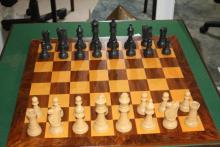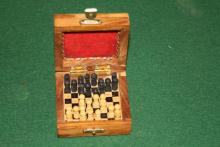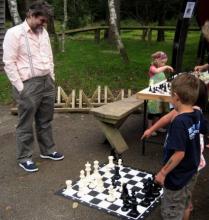F E A Kitto
Frank Kitto was the leading player in the club in the 1950s. He was a stocky figure with a ruddy complexion and dark curly hair — everybody's idea of a typical Cornishman. He didn't feel the cold and rarely wore socks and never an overcoat. He had, it was said, been a bomber pilot in the war, and in peacetime he was a psychologist. He lived in a ruinous Georgian country house in Kennford; there were holes in the floorboards and an unkempt tramp squatted in the hall the only time I was there. Kitto took in and looked after disturbed children until questions were asked in Parliament about conditions there. He had done nothing wrong but shortly afterwards went back to his native Cornwall, and died not many years later.
As a chessplayer he was both a godsend and a nightmare to team captains. He had a casual attitude to time and would hitch a lift to matches, often arriving half an hour late, and having to play at a faster rate than ordinary mortals. He usually had to borrow a pencil to record his moves and never preserved his games, which is a pity. In 1948 he tied for first place with Euwe at Plymouth. I remember a drastic win he had against Dr JM Aitken of Cheltenham in a National Club match. He often played the Vienna Gambit and on this occasion demolished Aitken in a very few moves. On another occasion he was playing CHO'D Alexander, also of Cheltenham, in a Bishop's Opening. Kitto as Black got an overwhelming position but lost. His explanation was simple — Alexander was the better player.
ARB Thomas
Andrew Thomas for many years taught mathematics at Blundell's School and after retiring continued to live in Tiverton until his death at the age of eighty in 1985. Beneath a calm and humorous exterior lay a fierce determination and a deep love of chess. Indeed in 1973 he published a book called just that — Chess for the love of it . It contains some of his best games, including wins against Penrose, Najdorf, and Unzicker, and a draw against Euwe.
He hated routine play and was always ready with way-out moves in the opening. I doubt if he modelled his play on any particular school or master, but 'The English Tartakower' sums him up as well as anything. He belonged to Tiverton and Exeter chess clubs and only played for Exeter in the National Club Championship on board two after Kitto. They made a formidable spearhead to the team, and we did rather well in the tournament in the 'fifties, sometimes getting beyond the regional rounds into the open competition, usually played by telephone at an agonisingly slow pace. Neither side could understand how it took so long to transmit the moves, and both harboured the unworthy thought that the other side was cheating.
HV Mallison
Harold Mallison fought and was badly wounded in the first World War, and spent the whole of his subsequent career as a University lecturer in mathematics in Exeter. He was by far and away the strongest player in the club between the wars, and repeatedly won the club championship. He was for many years before the Second War the County team captain.
By the 1950s he was almost blind and only played in the National Club matches and for Devon. For Exeter he was board three after Kitto and Thomas, and he also played on a high board for the county.
RB Copleston
Copleston was distantly related to the distinguished Jesuit philosopher FC Copleston. He had lived abroad in Argentina, and was an apple grower in Sidmouth. Like Kitto, he was an unusually courteous opponent. He drove his car with great verve, travelling in weekly from his house in Offwell, beyond Honiton, when well into his 'seventies. He could swallow scalding hot cups of tea, but was much more careful in the less dangerous activity of chess. He was knowledgeable about the openings and well informed on all aspects of the game.
AGH Winterburn
Archie Winterburn was a character, a Yorkshireman with a degree in geography. In the Second World War he served in the Navy as an oceanographer. In the 1950s and after, he taught geography at a private school in Exeter. He reminded me of Eeyore, the donkey in the Winnie the Pooh stories; like Eeyore, he always had a half-humorous grievance. Unlike Copleston, he knew nothing about the openings, and it was hair-raising to watch him negotiate the dangers of the early stages of a game. He would play only the Sicilian to 1. e4 and achieved much success against the unprepared. If he survived those perils his natural talents, which were considerable, gave him good chances of winning. Before he came to the West Country, he had belonged to Wood Green Chess Club, in North London, where the rules seem to have been rather peculiar. He was fond of relying on the authority of this strong and well-known club, and tried to impose its ideas on Exeter. For example, Wood Green didn't allow newcomers to enter the club championship during their first year of membership. If, improbably, Botvinnik had defected and applied to join Wood Green, he would not have become champion until his second year! Winterburn did his best to make Exeter conform to the Wood Green model. He devised the most complex handicap tournament known to man, the rules of which only he understood.
LCA Lewis
Another Yorkshireman, a keen gardener, and a kindly manager of the Exeter Social Security Office at a time when managers were less suspicious of claimants than they are in these cheeseparing days. When he was 16, in the early 'thirties, he had played in a simultaneous display against Alekhin. At one time a whole Rook up, he refused a draw, as any spirited youngster would. But when Alekhin gave him his full attention, having disposed of his other opponents, Les came to grief. He was still kicking himself 25 years later. He kept up the time-honoured tradition which laid down that strong players won the Exeter Championship in their first season. As I remember, Winterburn, for all his principles, did the same.
Brian Clapp

Standing, left to right H.V. Trevenen (Cornwall), A. Wilson-Osbourne (a founding father of WECU), R.A. Slade (Devon), Rowena Bruce and Ron Bruce (Plymouth), H.V. Mallison (Exeter), C. Sullivan (Bristol), C. Welch (another founder of the WECU) and Frank Kitto (Exeter).
Seated, left to right A.R.B. Thomas (Tiverton and Exeter), Mr. Keen (the proprietor of the café which was the tournament venue), and David Hooper (Somerset).
Photograph : Ken Whyld. This photograph was recently offered by Ken to the British Chess Magazine on the sad occasion of David Hooper's death. Many thanks to Ken for permission to publish here, to Ken Bloodworth for identifying those present, and to Bob Jones for providing it in this format.





























































